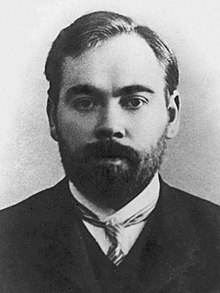This article has multiple issues. Please help improve it or discuss these issues on the talk page. (Learn how and when to remove these messages)
|
Alexander Bogdanov | |
|---|---|
Александр Александрович Богданов | |
 Bogdanov in 1903 | |
| Full member of the 4th, 5th Central Committee of the Russian Social Democratic Labour Party | |
| In office June 1906 – June 1909 | |
| Prospective member of the 3rd Central Committee of the Russian Social Democratic Labour Party | |
| In office 1905–1906 | |
| Personal details | |
| Born | Alyaksandr Malinovsky 22 August 1873 Sokółka, Grodno Governorate, Russian Empire (now Poland) |
| Died | 7 April 1928 (aged 54) Moscow, Russian SFSR, Soviet Union |
| Nationality | Russian |
| Political party | RSDLP (1898–1903) RSDLP (Bolsheviks) (1903–1909) |
| Alma mater | Moscow University, Kharkiv University |
| Occupation | Physician, philosopher, writer |
| Known for | Tektology |
Alexander Aleksandrovich Bogdanov (Russian: Алекса́ндр Алекса́ндрович Богда́нов; 22 August 1873 [O.S. 10 August] – 7 April 1928), born Alexander Malinovsky, was a Russian and later Soviet physician, philosopher, science fiction writer and Bolshevik revolutionary. He was a polymath who pioneered blood transfusion,[1] as well as general systems theory,[2] and made important contributions to cybernetics.[3]
He was a key figure in the early history of the Russian Social Democratic Labor Party (later the Communist Party of the Soviet Union), originally established 1898, and of its Bolshevik faction. Bogdanov co-founded the Bolsheviks in 1903, when they split with the Menshevik faction. He was a rival within the Bolsheviks to Vladimir Lenin (1870–1924), until being expelled in 1909 and founding his own faction Vpered. Following the Russian Revolutions of 1917, when the Bolsheviks came to power in the collapsing Russian Republic, he was an influential opponent of the Bolshevik government and Lenin from a Marxist leftist perspective during the first decade of the subsequent Soviet Union in the 1920s.
Bogdanov received training in medicine and psychiatry. His wide scientific and medical interests ranged from the universal systems theory to the possibility of human rejuvenation through blood transfusion. He invented an original philosophy called "tectology", now regarded as a forerunner of systems theory. He was also an economist, culture theorist, science fiction writer, and political activist. Lenin depicted him as one of the "Russian Machists".
- ^ Huestis, Douglas W. (1 October 2007). "Alexander Bogdanov: The Forgotten Pioneer of Blood Transfusion". Transfusion Medicine Reviews. 21 (4): 337–340. doi:10.1016/j.tmrv.2007.05.008. ISSN 0887-7963. PMID 17900494. Archived from the original on 1 July 2024. Retrieved 17 April 2023.
- ^ Gare, Arran (1 November 2000). "Aleksandr Bogdanov and Systems Theory". Democracy & Nature. 6 (3): 341–359. doi:10.1080/10855660020020230. ISSN 1085-5661. Archived from the original on 1 July 2024. Retrieved 17 April 2023.
- ^ Şenalp, Örsan; Midgley, Gerald (March 2023). "Alexander Bogdanov and the question of unity: An emerging research agenda". Systems Research and Behavioral Science. 40 (2): 328–348. doi:10.1002/sres.2923. ISSN 1092-7026. S2CID 256265208. Archived from the original on 17 April 2023. Retrieved 17 April 2023.